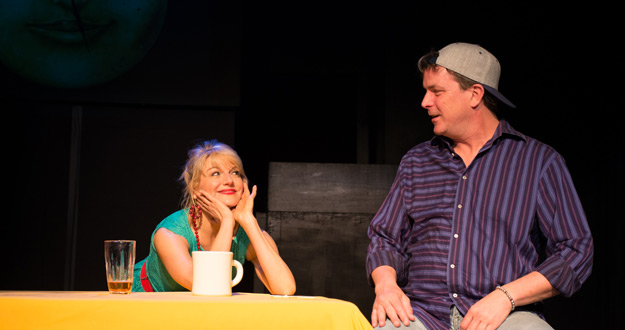Ambassador Theater Happily Ever After
By David Siegel • Mar 17th, 2014 • Category: Reviews
What a drag it is trying to find and keep love. Really, is it just helplessly hoping, even if there are apps to help find true love? Add some unhealthy doses of cynicism, lousy communication skills and a slew of phobias, and voilà , you have the premise behind the new production of Happily Ever After by Spanish playwright Cristina Colmena now at the Ambassador Theater.
Happily Ever After is a set of three short acts, each about 20 minutes in length, about terribly lonely people. It is best classified as a very dark drama-comedy that chronicles struggles in three vastly different relationships. Whatever chemistry there once was has been depleted into either verbal recriminations and brick-bats or fears of flying into a relationship with tiny hints of happiness peaking through.
The play, written in 2013, is receiving its première at the Ambassador Theater. Colmena is a writer and playwright born in Spain, now living in New York. She writes film reviews, articles and short stories. Her play Happily Ever After was included in the New Plays from Spain series as part of the PEN World Voices Festival 2013.
Happily Ever After is directed by Hanna Bondarewska, Artistic Director and Founder of the Ambassador. In program notes, Bondarewska mentioned that Happily Ever Afterprovides an opportunity “to discover new work from Spanish contemporary repertoire†and for “unveiling the richness of human nature.†The production features Karin Rosnizeck as “She†and Doug Krehbel as the characters “He.â€
Each of playwright Colmena’s scenes provides snapshot-like observations of often irritating characters of different ages sorting through what they want and what they have. The dialogue is simple, direct and spare; full of set-ups and verbal responses. There is a one night stand with modest potential to last longer, a passive-aggressive break-up of a six-month relationship after the early romantic blush has faded, and a one-note Virginia Woolf-like, older married couple bickering as they celebrate 30 years of marriage with the purchase of a new bed.
A pleasing musical underscore for the production is the preshow songs selected by David Crandall. There are about eight pop songs from the 1950′s-2010′s. The titles and lyrics set a mood for the evening. The music flows through Frankie Lymon and the Teenagers doing “Why do Fools Fall in Love,†The Shirelles with their “Will You Love Me Tomorrow?,†Al Green’s “Let’s Stay Together,†Robert Palmer’s “Addicted to Love,†Melanie Safka’s “I’ve Got a Brand New Pair of Roller-skates†and others. There is also fitting music selected for the three scenes.
The set by Jonathan Rushbrook is effectively minimalist. At scene one, there is a long table placed lengthwise to the audience with bar stools. In later scenes, the two actors move the table, transforming it into a bed with side tables. There are projected video images of different clock faces for each scene. The clocks have moving hands and ticking noises, also from David Crandall. The ticking provides for passing of time along with some ominous expressions of foreboding.
The first act is entitled “Misunderstanding.†It is early evening. Each of the two characters, “She†and “He†has the opportunity to speak in monologue of the spark being gone. She arrives as if late. She is in a cocktail dress and heels, immediately beginning to fix her lipstick and brush her hair. She is waiting for someone as she gulps a beer. He saunters into the scene wearing sneakers, jeans and a backward-facing baseball cap. He sits at the other end of the table. He has a coffee. And waits. They speak to us jabbering about their annoyance with the other. We learn that they are waiting for each other, but are in different places waiting. What we learn from all their talk is that what was once exciting is now boring. They have cell phones. Neither makes an effort to call the other. The relationship ends with a whimper. It is a chilly scene; two people very much alone.
“Don’t Take it Personally†is the second act. A couple is waking up at 5 AM in bed. Neither seems sure of the other’s name. She wants him to go. It is her bed. Not that he is a bad man, but well, she is very protective of herself. She has been hurt before, no need to get involved again. She doesn’t want to give real romance a chance, even as he tries, well tries a little. A bit of protectiveness lifts with cute comedic lines and the chemistry between Rosnizeck and Krehbel. Little sparks appear in the night’s darkness. The sparks are made visible with a sensual tango (choreographed by Francesca Jandesek and Dan Istrate). But she is aggressively unwilling to go beyond the encounter. Her fear’s overtake her. He does not push the matter. Cue Randy Newman’s “Better Off Dead.†If only one or the other could push beyond their regular reactions they might have been two together and not alone.
Scene #3 is “Melodrama.†This is the least successful of the trio of stories. Two grumpy people married for three decades have forgotten what brought them together. They have just purchased a new bed. They pick at each other in monologues and directly. Words are like viscous stilettos for him. She wants to be held and cared for; that is beyond him. He will only take photos of her with a fake smile to send to their daughter and grandchild. Thought empty they would rather be alone together than alone without someone breathing next to them. What emotions that exist are her feigned and real melodramatic efforts to be held. It is an attempt at foreplay without reciprocity. Is the new bed to sleep on, for romance, or just a new place to watch television?
Accomplished with economy, Happily Ever After is an intermission free hour gazing at three unhappy couples; each unhappy in their own ways [thank you, Tolstoy]. Happily Ever After is a tongue-in-cheek title waiting for a comma with a next phrase starting with “if.†Ah, what a mess it is finding and keeping love fresh. Still we try our best to find that special one.
For your reviewer let us end with this Randy Newman song title as a final coda, “I Think It’s Gonna Rain Today.â€
PHOTO GALLERY
|
 |
 |
|
| Doug Krehbel and Karin Rosnizeck |
|
| Karin Rosnizeck and Doug Krehbel |
|
|
Photos provided by Ambassador Theater
CAST
- She: Karin Rosnizeck
- He: Doug Krehbel
DESIGN AND PRODUCTION TEAM
- Directed by Hanna Bondarewska
- Choreography of Tango: Francesca Jandasek and Dan Istrate
- Lights: Stephen Shetler
- Costumes : Basmah Alomar
- Sound and Visual Effects Design: David Crandall
- Stage Manager: Madelyn Farris
Disclaimer: Ambassador Theater provided a complimentary media ticket to ShowBizRadio for this review.









 Un momento de la obra ’Happily ever after’, de la española Cristina Colmena y estrenada en Washington.Magda Pinkowska Gorman
Un momento de la obra ’Happily ever after’, de la española Cristina Colmena y estrenada en Washington.Magda Pinkowska Gorman



 Havel’s work paints a world composed of two stark opposite positions; either dissident or compromiser. He raises question to ponder. Who can you trust when your own freedom is at stake? What will you do to survive? How far will you go to prevent the loss of your own livelihood, or a risk aÂ
Havel’s work paints a world composed of two stark opposite positions; either dissident or compromiser. He raises question to ponder. Who can you trust when your own freedom is at stake? What will you do to survive? How far will you go to prevent the loss of your own livelihood, or a risk a 